February 03, 2016
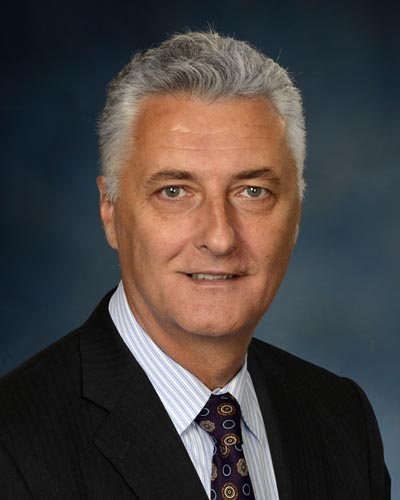
Collaboration Integrates Proton Therapy Research, Education and Clinical Care
William F. Regine, MD, FACR, FACRO, Chairman of the Department of Radiation Oncology at the University of Maryland School of Medicine (UM SOM), along with UM SOM Dean E. Albert Reece, MD, PhD, MBA, today announced the establishment of the Maryland Proton Alliance (MPA), a new organizational framework for proton therapy at UM SOM that may serve as a national model for patient-centered cancer care. The Alliance will be led by Zeljko Vujaskovic, MD, PhD, Professor in the Department of Radiation Oncology and head of the department’s Division of Translational Radiation Sciences. Dr. Vujaskovic succeeds Minesh Mehta, MBChB, who served as Medical Director of the Maryland Proton Treatment Center (MPTC) during its development from 2012 to 2015.
MPA is the result of long-term collaborative planning designed to make innovative research activities integral to the infrastructure of the new $200 million, 110,000-square-foot Maryland Proton Treatment Center (MPTC), which is now open and scheduled to begin treating patients in February. As part of its mission, the MPA brings together the multi-platform global research and education programs of the UM SOM with the clinical services of the MPTC—combining the resources of UM SOM and industry partner Advanced Particle Therapy, LLC, with support from federal, industry, regional and global stakeholders.

“The creation of the alliance as we prepare to see our first patients emphasizes our commitment to making MPTC a national and international leader in expanding and sharing knowledge about the best treatment approaches tailored to the precise needs of each patient,” said Dr. Regine, who is the Isadore & Fannie Schneider Foxman Endowed Chair in the Department of Radiation Oncology. “Both APT and UM SOM share the view that investments in research can have direct results in enhancing our success in cancer treatment. We look forward to extending this relationship to include many of our current and future federal, industry, and academic partners who have expressed interest in working with us.”
“The knowledge and technology that the APT/ UM SOM partnership has brought to Maryland will have real and immediate benefits for cancer patients in the region,” said Jeff Bordok, APT CEO. “APT remains committed to seeing that these benefits are extended into the future through an active and productive research program.”
 “This is an extraordinary opportunity,” said Dr. Vujaskovic. “As the only proton treatment center in the Baltimore–Washington region, we are in a unique position to partner with a wide range of public and private researchers, many of whom are only beginning to assess the potential value of this technology and are eager to work with a premiere academic institution in these efforts.” Over his career, Dr. Vujaskovic has developed diverse extramural partnerships and received funding from the National Institutes of Health, the Department of Defense, the Biomedical Advanced Research and Development Authority (BARDA), NASA, and others. He is an internationally recognized investigator in radiation effects on normal and tumor tissue. He has clinical expertise in prostate and bladder cancer treatment and is currently a leader in the innovative use of thermal therapy (hyperthermia) for various malignancies. Under his direction, the Division of Translational Research Sciences has become a leader in collaborative studies investigating medical countermeasures to radiation.
“This is an extraordinary opportunity,” said Dr. Vujaskovic. “As the only proton treatment center in the Baltimore–Washington region, we are in a unique position to partner with a wide range of public and private researchers, many of whom are only beginning to assess the potential value of this technology and are eager to work with a premiere academic institution in these efforts.” Over his career, Dr. Vujaskovic has developed diverse extramural partnerships and received funding from the National Institutes of Health, the Department of Defense, the Biomedical Advanced Research and Development Authority (BARDA), NASA, and others. He is an internationally recognized investigator in radiation effects on normal and tumor tissue. He has clinical expertise in prostate and bladder cancer treatment and is currently a leader in the innovative use of thermal therapy (hyperthermia) for various malignancies. Under his direction, the Division of Translational Research Sciences has become a leader in collaborative studies investigating medical countermeasures to radiation.
The MPA will build on an existing strong track record of research relationships with major academic centers, industry and the federal government to create new programs exploring the benefits of protons in treating cancer. As a result, Dr. Vujaskovic anticipates that this unique alliance will increase research funding, as well as create new research positions and educational opportunities for graduate students and other trainees.
“The Maryland Proton Alliance will serve as a focal point for first-in-the-region and first-in-the-nation investigations and research relationships,” said Dean Reece, who is also Vice President for Medical Affairs, University of Maryland and the John Z. and Akiko K. Bowers Distinguished Professor. “We are particularly pleased that Dr. Vujaskovic has accepted this challenge. His distinguished record in both research and clinical practice, and his leadership in radiation oncology here at UM SOM and internationally/nationally, make him ideally suited to lead this new initiative.”
About the University of Maryland School of Medicine
The University of Maryland School of Medicine was chartered in 1807 as the first public medical school in the United States and continues today as an innovative leader in accelerating innovation and discovery in medicine. The School of Medicine is the founding school of the University of Maryland and is an integral part of the 12-campus University System of Maryland. Located on the University of Maryland’s Baltimore campus, the School of Medicine works closely with the University of Maryland Medical Center and Medical System to provide a research-intensive, academic and clinically based education. With 43 academic departments, centers and institutes and a faculty of more than 3,000 physicians and research scientists plus more than $400 million in extramural funding, the School is regarded as one of the leading biomedical research institutions in the U.S. with top-tier faculty and programs in cancer, brain science, surgery and transplantation, trauma and emergency medicine, vaccine development and human genomics, among other centers of excellence. The School is not only concerned with the health of the citizens of Maryland and the nation, but also has a global presence, with research and treatment facilities in more than 35 countries around the world.
medschool.umaryland.edu/
About the Maryland Proton Treatment Center
The Maryland Proton Treatment Center offers proton therapy – a highly advanced and precise form of radiation therapy that can increase radiation dose to tumor while decreasing dose to healthy, surrounding tissue – to the Baltimore/Washington region and beyond. It is a highly effective treatment for a wide range of localized tumors such as those found in the brain, base of the skull, head and neck area, eye tumors, tumors of the esophagus, lung, prostate, liver, breast, spinal cord, as well as gastrointestinal malignancies. It is also an important treatment option for children with cancer.
At MPTC, each treatment room will be equipped with the most advanced form of “pencil beam” proton therapy, which essentially paints the radiation onto the tumor while stopping precisely at the site of tumor. Proton therapy is performed on an outpatient basis and is a well-tolerated, non-invasive treatment that can reduce side effects. It can be used in conjunction with other modalities of cancer treatments such as chemotherapy and surgery. MPTC will offer a robust clinical trial program to all its patients to further evidence-based research.
MPTC has been patient-centered from the beginning –with a focus on accessibility and affordability. The center was designed to be a regional resource, providing the same training, privileges and clinical guidelines to physician groups across the region who will work side-by-side with MPTC faculty and staff, thus improving efficiency and affordability. MPTC offers free concierge services to ensure a seamless patient experience and a successful reconnection back to their referring physician. Since the MPTC will be cost-neutral for insurance providers, patients will pay the same for proton treatment as they would for other more conventionally available intensity-modulated treatments at the University of Maryland.
Research has served as the foundation for the Department of Radiation Oncology’s unique provision of four advanced modalities for the treatment of cancer:
- Proton Treatment, a precise approach to cancer, which targets tumors while minimizing harm to surrounding tissues. Proton treatment uses protons traveling at about two-thirds the speed of light to precisely deliver beams of radiation to the tumor;
- Selective Internal Radiation Therapy, an advanced modality for treating patients with particularly difficult-to-remove cancers of the liver, including liver tumors spread from colorectal cancers;
- Gammapod, a new, first of its kind in the world, high-precision, noninvasive method of treating early-stage breast cancer;
- Thermal Therapies (also known as Hyperthermia), the use of heat in treating a broad spectrum of malignancies.
Learn More
Contact
Office of Public Affairs
655 West Baltimore Street
Bressler Research Building 14-002
Baltimore, Maryland 21201-1559
Contact Media Relations
(410) 706-5260
Related stories

Tuesday, February 19, 2019
Dr. Robert C. Miller, National Leader in Radiation Oncology, Named New Medical Director of Maryland Proton Treatment Center
William F. Regine, MD, FACR, FACRO, The Isadore and Fannie Schneider Foxman Chair and Professor of Radiation Oncology at the University of Maryland School of Medicine (UMSOM), along with UMSOM Dean E. Albert Reece, MD, PhD, MBA, announced today that Robert C. Miller, MD, MBA, FASTRO a nationally-recognized radiation oncologist who currently serves as Vice Chair in the Department of Radiation Oncology at the Mayo Clinic, has been named Professor in the UMSOM Department of Radiation Oncology and Medical Director of the Maryland Proton Treatment Center (MPTC). He will begin his new position in April 2019.
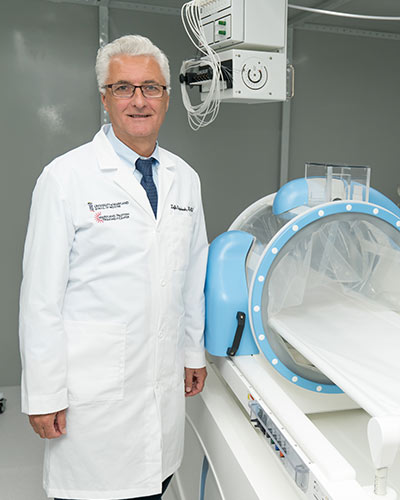
Monday, October 08, 2018
High-Precision Proton Therapy More Effective in Treating Certain Cancers When Combined with Thermal Therapy
The Maryland Proton Treatment Center (MPTC) is now offering deep-tissue external thermal therapy in combination with high-precision proton-beam radiotherapy as a potential way to boost survival chances for certain cancer patients. MPTC is the only center in the world to offer these two treatments at the same facility, an advantage to patients because these therapies are typically given within an hour of each other.
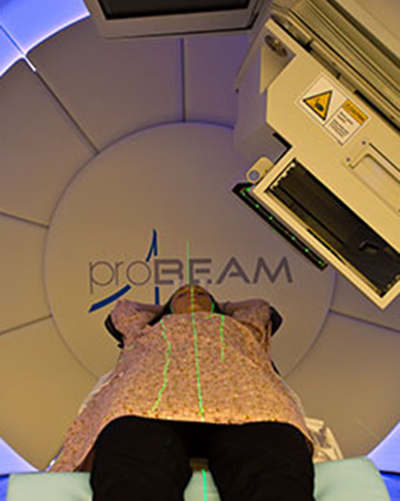
Tuesday, September 04, 2018
Maryland Proton Treatment Center Eyes Future, Strengthens Capital Structure with $277.4 Million Bond Deal
The Maryland Proton Treatment Center (MPTC) announced today that it has taken a major step in strengthening its balance sheet and capital structure to better position it to treat a growing number of cancer patients with its state-of-the-art therapy.
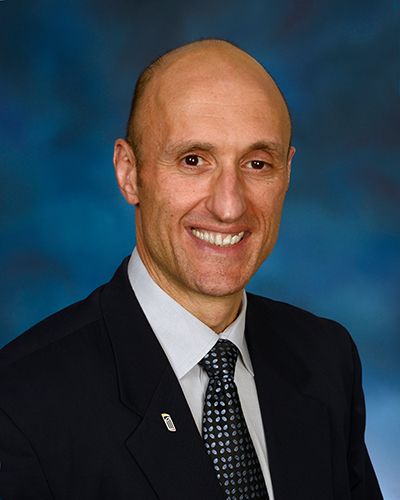
Thursday, October 27, 2016
Dr. William F. Regine is Awarded 2016 Entrepreneur of the Year From the University of Maryland, Baltimore
William F. Regine, MD, FACR, FACRO, the Isadore & Fannie Schneider Foxman Endowed Chair and Professor in Radiation Oncology at the University of Maryland School of Medicine (UM SOM) and Executive Director of the Maryland Proton Treatment Center (MPTC) has been awarded the 2016 Entrepreneur of the Year from the University of Maryland, Baltimore (UMB).
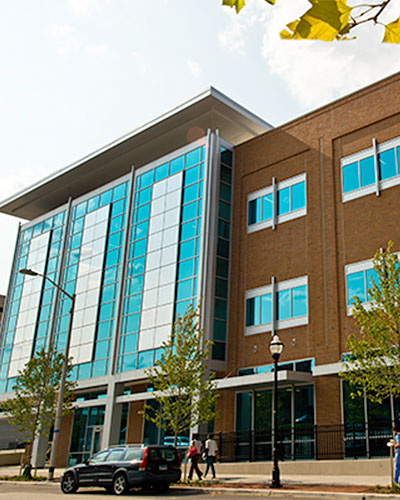
Wednesday, June 01, 2016
Maryland Proton Treatment Center Celebrates Grand Opening
The Maryland Proton Treatment Center celebrated the grand opening of its new $200 million, 110,000-square-foot facility in West Baltimore on June 1. More than 600 people – faculty members and staff, elected officials, community doctors and cancer survivors – attended the event. June 1 is National Cancer Survivors Day, and the event, which had a 'Survivor' theme, based on the reality TV show, also honored cancer survivors. The new facility is the first proton treatment center in the Baltimore-Washington area.

Tuesday, February 23, 2016
At University of Maryland, First Cancer Patients Receive Proton Therapy at New Maryland Proton Treatment Center
The University of Maryland School of Medicine (UM SOM) announced today that the Maryland Proton Treatment Center (MPTC) has treated its first cancer patients with proton therapy at a new $200 million facility in the University of Maryland BioPark in West Baltimore.
